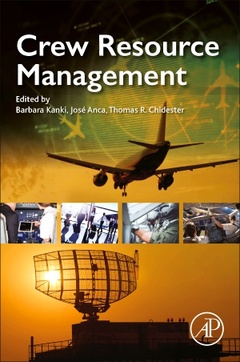Crew Resource Management (3rd Ed.)
Coordonnateurs : Kanki Barbara G., Anca José, Chidester Thomas R

Part I: The Nature of CRM 1
1. Why CRM? Empirical and Theoretical Bases of Human Factors Training
2. Teamwork and Organizational Factors
3. Crews as Groups: Their Formation and Their Leadership
4. Communication and Crew Resource Management
5. Flight Crew Decision-Making
6. CRM (Nontechnical) Skills: A European Perspective
7. Crew Resource Management and Individual Resilience
8. Crew Resource Management, Risk, and Safety Management Systems
Part II: CRM Training Applications
9. The Design, Delivery, and Evaluation of Crew Resource Management Training
10. Line Oriented Flight Training: A Practical Guide for Developers
11. Line Operations Simulation Development Tools
12. Crew Resource Management and Line Operations Safety Audit
13. Maintenance Resource Management for Technical Operations
14. Flight and Cabin Crew Teamwork: Improving Safety in Aviation
15. The Migration of Crew Resource Management Training
Part III: CRM Perspectives
16. A Regulatory Perspective
17. A Regulatory Perspective II
18. The Accident Investigator’s Perspective
19. The Military Perspective
20. Cultural Issues and Crew Resource Management Training
21. Airline Pilots, Training, and CRM in Today’s Environment
22. The Future of CRM
Training and safety managers in the aviation industry; CRM users in the aviation system; and human factors educators and researchers. Secondary market includes researchers in social psychology, human factors, communication studies, operations management, and safety and risk management.
Dr. Kanki’s research activities have ranged across human factors topics such as crew communication and coordination, organizational factors, information and workload management for aviation operations including flight crews, ground control, and technical operations. Her research interests include human-centered procedure and document design, integration and training for new technologies as well as safety topics such as voluntary reporting and event investigation. She has supported the space side of NASA in human and socio-technical risk factors, team training, and procedure design primarily for the space shuttle program at Kennedy Space Center and has participated on NASA mishap boards, safety assessments and National Transportation Safety Board human performance investigations. After retiring from NASA in 2014, Dr. Kanki continues to contribute to NASA projects and FAA/industry groups, and is the current chair of the Human Performance working group of the International Association for the Advancement of Space Safety.
Dr. Kanki received her doctorate in Behavioral Sciences from the University of Chicago, where she specialized in the areas of communication and group dynamics. She continues to author, edit, and review books, journals, and papers on human factors topics.
Joey Anca is the Human Risk Manager for Metro Trains Melbourne in Australia. Joey has a long career in aviation, having
- Addresses the expanded operating environment--pilots, flight attendants, maintenance, etc.
- Assists developers and practitioners in building effective programs
- Describes best practices and tools for supporting CRM training in individual organizations
- Highlights new advances and approaches to CRM
- Includes five completely new chapters
Date de parution : 02-2019
Ouvrage de 664 p.
15x22.8 cm
